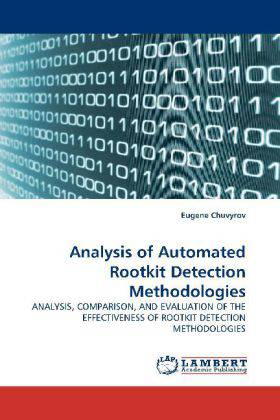
Bedankt voor het vertrouwen het afgelopen jaar! Om jou te bedanken bieden we GRATIS verzending (in België) aan op alles gedurende de hele maand januari.
- Afhalen na 1 uur in een winkel met voorraad
- In januari gratis thuislevering in België
- Ruim aanbod met 7 miljoen producten
Bedankt voor het vertrouwen het afgelopen jaar! Om jou te bedanken bieden we GRATIS verzending (in België) aan op alles gedurende de hele maand januari.
- Afhalen na 1 uur in een winkel met voorraad
- In januari gratis thuislevering in België
- Ruim aanbod met 7 miljoen producten
Zoeken
Analysis of Automated Rootkit Detection Methodologies
ANALYSIS, COMPARISON, AND EVALUATION OF THE EFFECTIVENESS OF ROOTKIT DETECTION METHODOLOGIES
Eugene Chuvyrov
Paperback | Engels
€ 70,45
+ 140 punten
Omschrijving
The focus of this study was to identify, analyze, compare, and evaluate the effectiveness of rootkit detection methodologies. Specifically, two methodologies were studied in depth. The first is the heuristic of statically analyzing kernel module binaries, which attempts to determine whether or not a software module's behavior is malicious, prior to passing it to the operating system. The second methodology analyzed in this paper, the Strider Ghostbuster framework, compares what a computer system believes to be true (i.e., what modules are visible to the OS) to the absolute truth, which is determined via low-level system programming. The expected results of this comparison should always be equal, unless a malicious tampering on the system is observed. After comparing the effectiveness of detection methodologies on a set of well-known (and publicly available) rootkits, including a very simple rootkit built by the author, the methodologies are compared and their effectiveness is evaluated.
Specificaties
Betrokkenen
- Auteur(s):
- Uitgeverij:
Inhoud
- Aantal bladzijden:
- 116
- Taal:
- Engels
Eigenschappen
- Productcode (EAN):
- 9783844384833
- Verschijningsdatum:
- 6/06/2011
- Uitvoering:
- Paperback
- Afmetingen:
- 150 mm x 220 mm
- Gewicht:
- 171 g

Alleen bij Standaard Boekhandel
+ 140 punten op je klantenkaart van Standaard Boekhandel
Beoordelingen
We publiceren alleen reviews die voldoen aan de voorwaarden voor reviews. Bekijk onze voorwaarden voor reviews.









